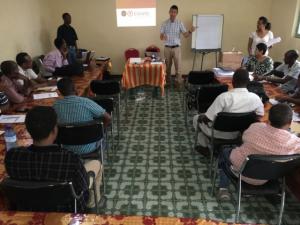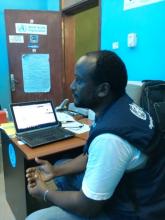Afar Regional Health Bureau in Ethiopia Receives Training on EWARS to respond to health and Nutrition Emergency
Samara, 20 April 2016 – The WHO Ethiopia Country Office (WCO Ethiopia) at the request of the Ethiopian Federal Ministry of Health conducted training on Early Warning Alert and Response System (EWARS) for the Public Health Emergency Management (PHEM) focal persons at health center and district level. The objective of the training was to strengthen and support PHEM. The training offers three key advantages: Real-time reporting and analysis of epidemiological data; Integration with nutritional surveillance at health center level; and Integration with alert and response including management and verification of disease alerts.
The WHO Regional Coordinator in Afar, Mr. Woisa Ahmed believes that EWARS is the best way forward to detect and report emergency health and nutrition situations timely and accurately. “We have paper based and SMS reporting mechanisms. The EWARS electronic based reporting, thus, will enhance our capacity to report outbreaks in real-time,” says Woisa. “This” he added “will enable us to enhance reporting, and expedite our response to help solve problem as quickly as possible”. The raining has brought together PHEM focal persons and partners, such as UNICEF, who are member of the regional health and nutrition task force.
According to Mr. Musa Abdu, The Afar Regional Health Bureau PHEM Focal Person, the EWARS mechanism is a step forward in detecting emergencies, early warning and response in the region. “We have established PHEM reporting chain, but at times data are not received accurately and timely. Therefore the EWARS mechanism will help us to not only facilitate the reporting, but also ensure real time reporting that caters for coordination of evidence based timely alert and response.”
The EWARS mechanism is a cell phone based application designed to fill the gap in information sharing and reporting from the health centers to districts, region and national level. The aim is to reduce the numbers of cases and deaths due to severe acute malnutrition and/or epidemic prone diseases due to the public health consequences of El Nino. This will be achieved by promoting the early detection of disease outbreaks and severe acute malnutrition and develop stronger links to public health action through the initiation of timely and effective response efforts.
Abdu mentioned recent flood situation in three districts (Dalol, Kunaba, Megale of zone two in Afar) that claimed the lives of few people and few goats as an example. “The situation was reported and the data was passed on to us using the existing mechanism having waited for the weekly reporting method, which I would say is late. Had we had the EWARS technology assisted reporting system we could have known of that in real time and mobilized resource to help the affected population and detect and control potential outbreak much faster than now. This is incredible, my heart felt gratitude goes to WHO and its staff members for this training as well as other supports we keep receiving.”
Dr. Christopher Haskew, WHO Epidemiologist who coordinates the EWARS project in WHO Headquarters, strongly recommends the EWARS in countries like Ethiopia. “In countries such as Ethiopia, emergencies like El Nino can quickly overwhelm existing national systems or place additional demands on them”. As a WHO global initiative that works towards strengthening EWARS is concerned with enhancing and facilitating data collection of Nutrition and Public health emergencies.
EWARS has been proven effective so far in supporting national surveillance systems in Fiji and South Sudan. Ethiopia is the 3rd country to come onboard. “Myself and Dr. Niluka Wijekoonnaranga from HQ and also colleagues from WCO and the Afar Regional Health Bureau are here to train the application for effective use in the emergency hotspot areas identified as priority one districts” Dr. Christopher. Eventually, the support will continue to all similarly affected regions in the country.
It is to be recalled that EWARS training of trainers was conducted nationally to PHEM focal persons and data managers from all regions and EPHI just a week ago in Adama. This training, therefore, is cascading down the technique to the local personnel on the ground who would be using the system.
For more information, please contact:
Mikias SISSAY
Emergency Communication Advisor
email: %20sissaym [at] who.int (sissaym[at]who[dot]int)





